| Srl | Item |
| 1 |
ID:
095219
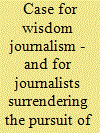

|
|
|
| 2 |
ID:
106690


|
|
|
| 3 |
ID:
102152
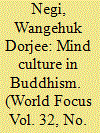

|
|
|
| 4 |
ID:
106407
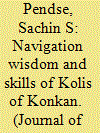

|
|
|
| 5 |
ID:
087592


|
|
|
|
|
| Publication |
2009.
|
| Summary/Abstract |
Experience has lessons to impart. Its
ability to teach, however, turns on our
willingness to learn. Attending to the
lessons of human experience brought
American pragmatists of the nineteenth
century to a new conception of philosophy,
one that embraced the fallibilism
that had long de½ned the natural sciences.
It led them back to the abiding
existential questions that underpinned
the Wisdom Traditions of the past in
order to explore the personal, social,
and political trials of the present. These
thinkers established a new intellectual
tradition that allows
|
|
|
|
|
|
|
|
|
|
|
|
|
|
|
|
| 6 |
ID:
106880


|
|
|
|
|
| Publication |
2011.
|
| Summary/Abstract |
Recent political events, such as the coup of 2006 or the 'Red Shirt' uprisings of 2010 underlined the divisions in Thai society between the provinces and the capital. As one of the world's most primate cities, Bangkok exerts a tremendous political, economic and cultural force upon the rest of Thailand. But how is such pressure interpreted, internalised and/or subverted? In this article, I look at Thailand's second-largest city, Chiang Mai, in Thailand's North, and the struggle to cure an increasing sense of urban crisis and thereby assert the former independent capital's symbolic authority vis-à-vis Bangkok. I examine this by looking at two specific discourses: that of architecture and spirit mediumship. Northern Thai architects attempt to cure Chiang Mai's ills through recourse to the 'cultural heritage' of the city's urban space, while spirit mediums call upon the sacred power of that space in order to restore Chiang Mai's 'lost' prosperity. The focal point for each effort lies at the city's centre: the Three Kings Monument and its surrounding plaza (khuang). Here, each group casts themselves as those most able to put Chiang Mai's past in physical form and thereby ensure Chiang Mai's future. In this article, I examine how ideas of cultural heritage become entwined with magico-religious concepts of power (sak). In each, there is a search for efficacious power in the face of political and cultural domination from Bangkok.
|
|
|
|
|
|
|
|
|
|
|
|
|
|
|
|
| 7 |
ID:
090262
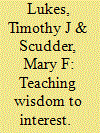

|
|
|
|
|
| Publication |
2009.
|
| Summary/Abstract |
We suggest that Book Five of the Republic, where Plato discusses the status of women in the guardian class, is a superb source of Platonic insight. For it is precisely the discussion of women that is most vulnerable to co-optation by the modern vernacular of interest, a vernacular to which the Republic is vehemently opposed. If students come to appreciate an alternative perspective regarding this most sensitive of modern issues, the full impact of the Socratic approach is available to them.
|
|
|
|
|
|
|
|
|
|
|
|
|
|
|
|
| 8 |
ID:
103278


|
|
|
| 9 |
ID:
148029
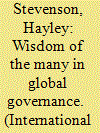

|
|
|
|
|
| Summary/Abstract |
A growing body of literature highlights moral reasons for embracing global democracy. This literature justifies democracy on the grounds of its intrinsic value. But democracy also has instrumental value: the rule of the many is epistemically superior to the rule of one or the rule of the few. I draw on the tradition of epistemic democracy to develop an instrumentalist justification for democratizing global governance. I develop an epistemic-democratic framework for evaluating political institutions—one composed of three principles. The likelihood of making correct decisions within institutions of global governance increases when those institutions maximize (1) human development and capacity for participation; (2) their internal cognitive diversity; and (3) public opportunities for sharing objective and subjective knowledge. Applying this framework to global governance produces a better understanding of the nature and extent of its “democratic deficit,” as well as the actions required to address this deficit.
|
|
|
|
|
|
|
|
|
|
|
|
|
|
|
|
| 10 |
ID:
107201
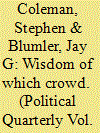

|
|
|
|
|
| Publication |
2011.
|
| Summary/Abstract |
his article considers the claims made by members of the current UK Coalition government to adopt a new style of listening, consultative politics based upon the so-called wisdom of the crowd. It considers how these claims have-and could have-been acted upon, focusing upon two central policy proposals; the funding of higher education and the reform of the National Health Service.
|
|
|
|
|
|
|
|
|
|
|
|
|
|
|
|